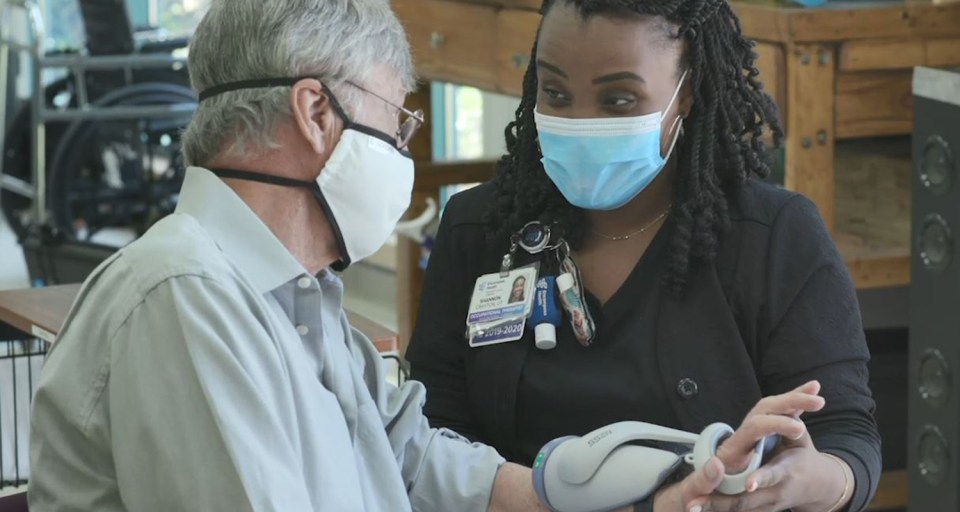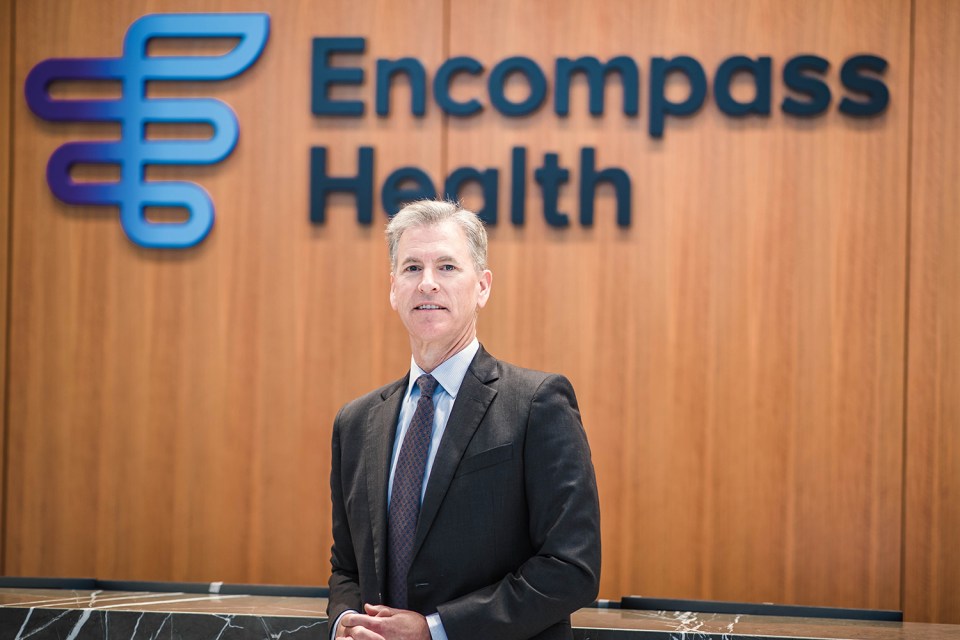As 2019 comes to a close, we all have our sights set on 2020 and what the new year will bring. In the ever-evolving landscape of healthcare, it’s always hard to say—even harder during an election year.
However, Mark Tarr, president and CEO of Encompass Health, agreed to take a stab at it and sat down with the Connect blog team to share his predictions on what’s in store for 2020. Here are a few of Tarr’s predictions for 2020:
1. The use of artificial intelligence (AI) and predictive analytics to drive outcomes will continue but will only be successful when coupled with interventions.
Artificial intelligence and predictive analytics have made great gains in the last decade in collecting data from electronic health records to identify trends, alerting healthcare workers of potential problems before they occur. Without proper interventions in place and sound judgement from clinicians, though, these predictive analytics can’t be successful. That’s why our 90-day readmission risk model that we are rolling out in our hospitals in 2020 has a clinical intervention protocol in place when the model identifies a patient as high risk of a hospital readmission. It’s those early interventions that we believe will help further reduce the risk of a readmission. AI will definitely continue to have a place in healthcare, but it must not replace sound clinical judgement.
2. The shift to value-based care is not going away.
Value-based care focuses on quality and puts patients at the center of care. The move away from fee for service to value-based care will continue to evolve in 2020, making strategic post-acute partnerships more appealing. These types of partnerships are nothing new to Encompass Health; we have more than 45 joint ventures with a variety of acute care providers, including faith-based, academic and non-profit systems. We know that a successful joint venture requires a post-acute provider willing to offer innovative solutions to improve quality while also reducing the overall cost of care.
3. As the population gets older, the demand to ‘age in place’ and live independently longer will also grow.
The oldest baby boomers will turn 75 in 2020, and by 2030, one in five Americans will be over the age of 65. This demographic tailwind and the preference to age in place will only increase the demand for home-based care. As one of the largest providers of home-based care, we’ll be there to meet that need. And for those more complex patients not yet ready for home care, we can help get them home by providing intense therapy and medical care at our inpatient rehabilitation hospitals.
4. Payors will continue to see the value in inpatient rehabilitation for Medicare Advantage (MA) plan holders.
We have seen an increase in MA activity over the last year, and we expect that to continue in 2020, relative to their understanding of the value proposition when a patient comes to an inpatient rehabilitation facility versus a skilled nursing facility. We are better equipped to handle those more complex patients, especially those coming to us with neurological conditions, such as stroke. One third of the cases that we have now from MA are stroke cases. Our strategic sponsorship and comarketing with the American Heart Association/American Stroke Association’s Together to End Stroke started in 2019, and it will continue in 2020 and beyond. It is our hope that through this sponsorship we can spread the word that whenever possible, stroke patients should be treated at an inpatient rehabilitation facility, where they can receive an integrated and intensive approach to rehabilitation with a dedicated stroke rehabilitation team providing a minimum of three hours of intense therapy a day, five days a week.
5. 2020 will be a transition year on the regulatory front for post-acute providers.
In 2019, CMS announced three major payment changes in post-acute care; 2020 will be a year of adjustment to those changes. Time will tell how skilled nursing facilities will be impacted by the Patient Driven Payment Model (PDPM), and if this will affect patients’ access to rehabilitation and therapy. At Encompass Health, our inpatient rehabilitation hospitals transitioned from the FIM functional assessment to the Section GG functional measures. We were prepared for the change but expect to make adjustments in 2020 as we continue to learn. In our home health segment, the Patient Driven Groupings Model (PDGM) takes effect on Jan. 1. We don’t know the full impact this will have on the industry, but we feel prepared for the shift. Though there are still a lot of unknowns with PDGM, we also believe there are some opportunities for our Company. We’ll be looking at markets where we think there is going to be some provider disruption to see if there are opportunities for growth and expansion for our Company. We believe Encompass Health is better positioned to handle these changes than some of these smaller home health agencies, which will then present acquisition opportunities for us.
6. Florida’s repeal of its CON law will open up opportunities for growth.
Repealing Florida’s Certificate of Need law has been a hot topic for nearly a decade. It finally happened earlier this year, and it could be a game changer for the Sunshine State. The CON regulations dictated where and when a hospital could build or expand in the state, subjecting all new builds or expansions to regulatory reviews. With the exception of hospice agencies and nursing homes, the repeal will make it easier to open new or expand in existing hospitals in Florida, as they would not be subject to such reviews. This will create a more competitive landscape, giving patients more options in their care.
7. Expect some heated debates surrounding the future of healthcare.
It is an election year after all. Healthcare, as it typically is, will be at the forefront of the political discussions in 2020 as both parties vie for the White House. Whether it’s dismantling or reinforcing the Affordable Care Act or moving to Medicare for All, we’ll hear a lot about the future of healthcare. Just what that may be, I think that will be a prediction for 2021.
Forward-Looking Statements
Statements contained in this blog post which are not historical facts, such as those relating to demographic shifts and the industry shift to value-based care, the results of our sponsorship of Together to End Stroke, regulatory changes, and our growth plans, are forward-looking statements. In addition, Encompass Health, through its senior management, may from time to time make forward-looking public statements concerning the matters described herein. All such estimates, projections, and forward-looking information speak only as of the date hereof, and Encompass Health undertakes no duty to publicly update or revise such forward-looking information, whether as a result of new information, future events, or otherwise. Such forward-looking statements are necessarily estimates based upon current information, involve a number of risks and uncertainties, and relate to, among other things, future events, its business strategy, its projected business results or model, its acquisition opportunities, and the impact of future legislation or regulation. Actual events or results may differ materially from those anticipated in these forward-looking statements as a result of a variety of factors. While it is impossible to identify all such factors, factors which could cause actual events or results to differ materially from those estimated by Encompass Health include, but are not limited to, the any adverse outcome of various lawsuits, claims, and legal or regulatory proceedings involving Encompass Health, including any matters related to yet undiscovered issues, if any, in acquired operations; Encompass Health’s ability to attract and retain key management personnel; potential disruptions, breaches, or other incidents affecting the proper operation, availability, or security of Encompass Health’s or its vendors’ information systems, including unauthorized access to or theft of patient, business associate, or other sensitive information or inability to provide patient care because of system unavailability as well as unforeseen issues, if any, related to integration of acquired systems; the ability to successfully integrate acquired operations, including realization of anticipated tax benefits, revenues, and cost savings, minimizing the negative impact on margins arising from the changes in staffing and other operating practices, and avoidance of unforeseen exposure to liabilities; Encompass Health’s ability to successfully complete and integrate de novo developments, acquisitions, investments, and joint ventures consistent with its growth strategy; increases in Medicare audit activity, including increased use of sampling and extrapolation, resulting in additional unpaid reimbursement claims and an increase in the backlog of appealed claims denials; changes, delays in (including in connection with resolution of Medicare payment reviews or appeals), or suspension of reimbursement for Encompass Health’s services by governmental or private payors; changes in the regulation of the healthcare industry at either or both of the federal and state levels, including as part of national healthcare reform and deficit reduction (such as the patient driven groupings model and other payment system reforms); competitive pressures in the healthcare industry and Encompass Health’s response thereto, including any resulting from the repeal of CON laws; Encompass Health’s ability to obtain and retain favorable arrangements with third-party payors; Encompass Health’s ability to adapt to changes in the healthcare delivery system, including value-based purchasing and involvement in coordinated care initiatives or programs that may arise with its referral sources; Encompass Health’s ability to attract and retain nurses, therapists, and other healthcare professionals in a highly competitive environment with often severe staffing shortages; and other factors which may be identified from time to time in Encompass Health’s SEC filings and other public announcements, including Encompass Health’s Form 10-K for the year ended December 31, 2018 and Form 10-Q for the quarters ended March 31, 2019, June 30, 2019, and September 30, 2019.
The content of this site is for informational purposes only and should not be taken as professional medical advice. Always seek the advice of your physician or other qualified healthcare provider with any questions you may have regarding any medical conditions or treatments.



